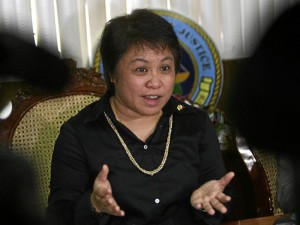MANILA, Philippines—Infrastructure holding firm Metro Pacific Investments Corp. has set up an American depositary receipt (ADR) system in a bid to increase its visibility and name recognition in the investor community in the United States.
In an interview last week, MPIC chief finance officer David Nicol said common shares which were part of MPIC’s existing public float were put into the ADR through appointed depositary bank Deutsche Bank.
Nicol said 100 million was the “absolute maximum” number of underlying MPIC shares put into the ADR, which would be sold based on demand.
“The 100 million are existing MPIC shares that investors can buy through ADRs,” he said.
In general, ADRs refer to negotiable certificate issued by a bank in the US that serves as a proxy to a specified number of shares in a foreign stock that are traded on the stock exchange. They are denominated in US dollars, with the underlying security held by a US financial institution. Such an instrument is deemed as a good option to acquire an interest in a foreign company while collecting dividends and capital gains in US-dollar denomination.
In this case, each ADR will represent 200 ordinary common shares of MPIC that are already existing and traded on the Philippine Stock Exchange.
Nicol said the ADRs would mirror economic interest in underlying MPIC shares. The US dollar conversion of MPIC shares are still “incredibly low” at 10 to 11 cents, implying that Deutsche Bank has to pool more shares for each ADR to be at par with US standards.
“If someone wants to buy an ADR then Deutsche Bank is going to the market here and find someone willing to buy the shares to put on to the ADR,” Nicol said.
“It’s good for the shareholder base because the more people buy, the more interest there will be in the company,” he added.
What was set up last week was a “level 1” ADR program through appointed depositary Deutsche Bank. This is the simplest form of sponsored ADR, which means that it is a non-capital raising activity and MPIC will not have the benefit of listing on the US stock exchange. However, its ADRs can be traded over the counter and there are no reporting obligations to the US stock exchanges.
A “Level 2” sponsored ADR is also noncapital raising but allows the issuer to attain full listing on the US stock exchange, which means it has to comply with reportorial obligations.
“Level 3” is the capital-raising exercise, which means the issuer is selling ADRs to get new money. It gets the benefit of listing and its security is treated like that of any mainstream US company, subject to reportorial obligations.
Nicol said MPIC had no plan to increase the level of its ADRs. “The capital market has evolved so much that debt in Philippine market is great and we have no intention to raise the money. If we have to raise more money, the (local) market can take it without worrying about the US,” he said.


